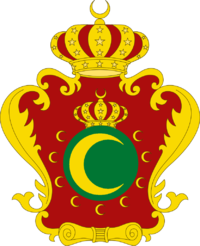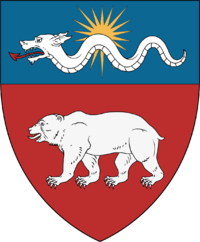Treaty between Çakaristan and International Mandate
The Treaty of friendship and cooperation between the Ultimate Çakar Sultanate and the International Mandate for the Settlements in Apollonia was signed and ratified in 1691 AN.
Text
TREATY OF FRIENDSHIP AND COOPERATIONBETWEEN
THE ULTIMATE ÇAKAR SULTANATE
AND
THE INTERNATIONAL MANDATE FOR THE SETTLEMENTS IN APOLLONIA
His Majesty, Akbar Çakar, Sultan of Çakaristanand
His Excellency, André Vales, First Consul of the Mandate
desire for a diplomatic relationship and good understanding between them, underpinning further friendship between their respective countries, have agreed to the following articles of agreement:
Article I – Peace and friendship
There shall be a firm and perpetual state of peace and friendly relations between His Majesty, the Sultan of Çakaristan and His Excellency, the First Consul of the Mandate, between Their Heirs or Successors, and between the Ultimate Çakar Sultanate and the International Mandate for the Settlements in Apollonia, in this treaty the High Contracting Parties, and between their Citizens, without discrimination.Article II - Sovereignty and territorial integrity
Each High Contracting Party shall respect the independence, sovereignty and territorial integrity of the other party. The High Contracting Parties shall continue to develop and consolidate the relations of sincere friendship, good neighbourliness and comprehensive cooperation existing between them on the basis of the aforesaid principles as well as those of equality and mutual benefit.Territorial integrity includes the territory of a High Contracting Party to the extent acknowledged and published by the Micronational Cartography Society. The territory extends 24 kilometres from the baseline coast of the High Contracting Party. Including the localities where the coastline is deeply indented and cut into, or if there is a fringe of islands along the coast in its immediate vicinity, the method of straight baselines joining appropriate points may be employed in drawing the baseline from which the breadth of the territorial sea is measured.
The reserve zone of a High Contracting Party extends 360 kilometres from the baseline coast. The economic and environmental resources within this zone belong fully to that High Contracting Party. In special situations where the territorial waters or the reserve zone of the High Contracting Parties would overlap, the line of separation will be drawn along the midpoint between the baseline of each High Contracting Party.
Article III - Airspace
Each High Contracting Party commits that any overflight of its airspace by aircraft registered upon the territory of the Other High Contracting Party, whose source and destination are outside the jurisdiction of the Overflown High Contracting Party and which make no intermediate landing upon the territory of the Overflown High Contracting Party, shall be considered to fall outside the remit of customs or immigration regulations and wholly outside the jurisdiction of any Third Parties, without prejudice to the exclusive right of the Overflown High Contracting Party to approve or deny such overflight as it sees fit.The High Contracting Party can set up a Prohibited airspace, an overflight is strictly prohibited. The High Contracting Party informs about Prohibited airspace and appropriate punitive measures follow an overflight of an aircraft registered with the other High Contracting Party.
Article IV – Diplomatic mission
The High Contracting Parties will maintain regular contacts with each other on major international problems affecting the interests of both of their countries and governments by means of meetings, and exchanges of views between their leading statesmen, visits by official delegations and special envoys of the governments, and through diplomatic channels.The High Contracting Party will make an embassy available for each other.
For the embassy, associated grounds, associated vehicles, leading statesmen, visits by official delegations, special envoys of the governments and ambassadors, diplomatic immunity applies.
Each High Contracting party recognizes and respects the procedures of acceptance by the ambassador, by handing over a letter of credence, which is addressed from one head of state to the other asking to give credence.
Article V - Recognition of bureaucracy
Each High Contracting Party gives to the other full faith and credit to all public acts, records, contracts and judicial proceedings in the field of civil law, including records and documents on marriage, property, titles, death and inheritance, in as much as any act, record, document, contract, proceeding is done according to the law.Article VI - Interpretation
Any difference of interpretation of any Article or Articles of this Treaty which may arise between the High Contracting Parties will be settled bilaterally by peaceful means in a spirit of mutual respect and understanding.Article VII - Ratification
This Treaty enters into force upon its signature and ratification by Both High Contracting Parties in accordance with their respective domestic procedures.
Signed on 11.XI.1691 AN:For the Ultimate Çakar Sultanate:
Akbar Çakar
Sultan of ÇakaristanFor the International Mandate for the Settlements in Apollonia:
André Vales
First Consul of the Mandate
ADDENDUM I
In order to promote trade between the Ultimate Çakar Sultanate and the International Mandate for the Settlements in Apollonia, the two nations are restoring the old railway line between Tiegang and Tiren. This will provide a connection to the sultanate's rail network, allowing goods trains in particular to supply the sultanate from the port of Tiegang.
Article A - Railway
The old railway line between Tiegang and Tiren will be restored with a track gauge of 1,676 mm (5 ft 6 in), electrified with 25 kV, 50 Hz AC. The line will be connected to the railway network in the sultanate. It will also be connected to the port in the International Mandate.Article B - Costums
In order to organise customs, a customs checkpoint will be set up in the International Mandate for the sultanate. Trains that have been checked and passed through can travel non-stop to the sultanate.Article C – Security of rail traffic
In order to ensure the security of rail traffic, there is close cooperation between the rail traffic control authorities of the two nations. Rail traffic on the entire route is visible to both nations.Article D – Trans Apollonia Express
To promote passenger rail transport, the two nations are setting up the Trans Apollonia Express. A direct scheduled service between Agra and Tiegang will be established.

